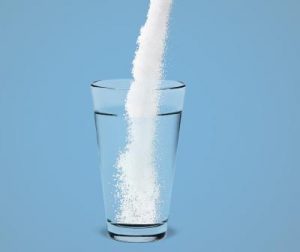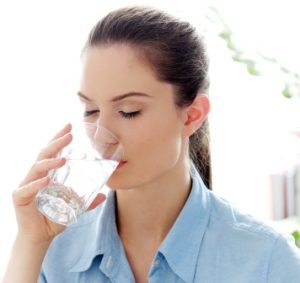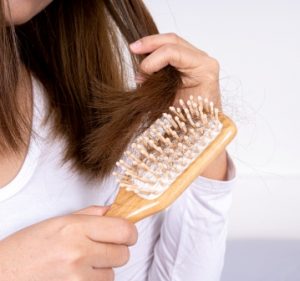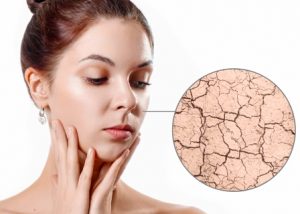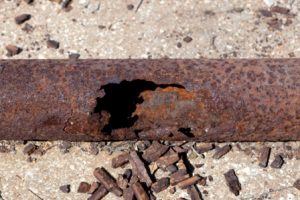You must have heard the term “hard water” and how people state that you should avoid using this kind of water for specific grounds.
Such as don’t use hard water on your skin; it will become dry, or try consuming hard water; it will make you healthier. But do you ever think why people say such things and what hard water truly means?
If not, then don’t worry because, in this article, I will discuss everything about hard water and its advantages and disadvantages.
So stay tuned!
What Is Hard Water?
Hard water can be described as water that contains a high level of minerals in ions. Hard water gets formed when high mineral contents get dissolved in the water. Magnesium and calcium are the two notable minerals that raise the hardness level of water.
Hard water is a natural outcome during the water cycle as the water evaporates from the oceans to convert it to the clouds and then drops them back down in the form of rain.
It is typical for magnesium and calcium to accumulate. The more magnesium and calcium get dissolved in the water, the more it would raise the hardness level of water.
Types of Hard Water
Hard water is divided into two types. The categorization of hard water is based on whether the dissolved minerals of hard water can be eliminated using natural methods or not.
Temporary Hard Water
When bicarbonate minerals such as calcium bicarbonate and magnesium bicarbonate are dissolved in water, it is known as Temporary Hardness.
This dissolved bicarbonate provides a yield cation of magnesium and calcium along with bicarbonate anions in the water. These cations present make the water hard.
However, in these cases, you can reduce the hardness of water by boiling or heating the water—heating hard water results in increasing the water temperature, resulting in the decomposition of bicarbonate ions present. Thus, it is known as “Temporary hard water.”
Permanent Hard Water
Permanent hard water contains magnesium chloride/sulfate or calcium sulfate/chloride. The presence of such magnesium and calcium makes the water hard.
You can’t use the boiling or heating process to reduce water hardness with such ions present because the ions don’t precipitate out.
Thus, they are referred to as Permanent hard water because, unlike temporary hard water, you can’t get rid of hardness using natural methods.
Advantages Of Hard Water
When it comes to hard water, we can say there aren’t a lot of advantages, but it doesn’t mean there are any. You can get a few benefits of using hard water, which is as follows:
Better At Taste
Water doesn’t have a taste, but when water comes in contact with sulfates, bicarbonates, magnesium, and calcium carbonates.
These high amounts of minerals make the water hard and provide a taste and sometimes even a smell. This taste tends to make some people want to consume hard water.
Strengthens Your Teeth And Bones
Hard water contains magnesium and calcium, acting as a dietary supplement. As we know, our teeth and bones are made with calcium.
When hard water is consumed, the high level of calcium present in water helps strengthen your teeth and bones, resulting in a good source for providing necessary amounts of minerals to the body regularly.
Helps In Constipation & Digestive Health
The magnesium and calcium ions in hard water can help fight constipation and reduce it. Along with that, when excess fats and bile is combined with hard water containing calcium.
It can help remove substances from your body with the help of bowel movements, due to which hard water works as a great source for solving such health-related issues.
Therefore, we can say hard water isn’t all bad. In fact, hard water is considered pretty good for drinking as it benefits teeth, bones, and our digestive health.
Disadvantages Of Hard Water
Now that we have addressed the benefits provided by hard water, let’s look into the disadvantages of having hard water:
It Doesn’t Form Lather
Hard water can’t be used for washing clothes because it doesn’t have the ability to generate Lather from the soap. The Lather is basically mass white bubbles formed when the soap is combined with water which is essential for cleaning and washing purpose.
Instead of generating these bubbles to clean clothes, it creates white precipitate or scum that gets stuck in the clothes, making the process of cleaning clothes ineffective.
Therefore, you can use soft water to wash clothes because it can quickly generate mass bubbles, create no white precipitates on clothes, and keep the color of clothes safe.
Meanwhile, hard water can leave several stains on your clothes. The scum produced by hard water can cause dullness to your clothes by washing away the colors. It also turns your clothes scratchy due to calcium scum present.
So if you have witnessed such issues in your clothes, then it’s due to hard water.
It Affects Your Hair
Washing your hair with hard water can be an extremely bad idea. Hard water can make your hair rough and dry.
The minerals present in hard water form a curd-like substance that sticks to your hair. This causes your hair to have frizziness and dullness. Constant use of hard water in your hair can even lead to hair fall. So, it is better not to have such hard water in your hair.
Affects Your Skin
Using hard water on the skin can make your skin dry and cause itchiness. When hard water is used on the skin, it tends to have the leftovers of the soap used that can get stick to your body, generating eczema-like symptoms that are highly common among children.
Due to this, it is better to avoid using hard water on your skin to prevent it from excessive dryness. Instead, use soft water as it contains few elements and can make your skin smoother and softer.
Pipe Corrosion
Hard water can cause a significant pipe to corrode or materials of several pipes to break down, causing water to fall out of pipes. Pipe corrosion can also be very unsafe for consumption as it can leach the metals into water, making it dangerous. Apart from corrosion, hard water can also cause a clog in the pipe, resulting in slowing down the flow of water.
Stains
Hard water can leave stains in your bath fittings, tiles, sink, drinking glasses, and more. The calcium deposits heavy layers in your bath tiles or fittings, which can be difficult to remove.
You can even find these watermarks or stains in your utensils, such as glasses, cups, plates, and more. The majority of the time, you might find a cloud-shaped stain caused by the use of hard water, and these stains can be really difficult to get rid of.
So, if you are witnessing the color of your clothes getting washed, or it becoming dull, then it might be because of hard water.
Decrease Appliances Lifespan
Constant use of hard water in your household appliances like faucets, washing machines, and more can lower the lifespan of your devices.
The minerals present in hard water can decrease the efficiency of your appliances, along with wearing them down slowly. For example, a faucet has a lifespan of nine years which may decrease to five years due to excessive use of hard water.
Usually, a life span of a washing machine is around 11 years, but it may also decrease to 7 years due to excessive use of hard water. The majority of households are likely to get affected due to the use of the wrong water.
So, it would be certainly best for you if you were careful about the appliances present in your house.
Therefore, hard water might be fine for drinking, but it can be a disaster for other purposes.
FAQs
1. Is rainwater soft or hard water?
When rain falls, it’s soft water, but when this rainwater comes in contact with the ground, it picks up several minerals like lime, chalk, magnesium, and more, turning them into hard water.
2. Why does hard water taste?
Minerals present in hard water are what bring out a taste in hard water. You can even get rid of this taste by using the best water purifiers. It helps in removing the taste caused by minerals in hard water.
3. Should I drink hard water?
Yes, hard water is generally safe. There isn’t a significant issue that can be caused to the body due to hard water consumption. Hard water is considered suitable for health as it fulfills the dietary needs of essential minerals. Thus, you can drink it.
You May Also Like To Read:
How to Convert Hard water to Soft Water?
How to Buy the Right Water Purifiers
Conclusion
Hard water is standard, and it provides a few good things while some harmful impacts. But a clear no when it comes to household appliances, pipes, hair, and skin.
They can be great for the body, especially the digestion health along with bones and teeth. So we can say hard water is both good and wrong based on specific grounds.
If you have any questions about hard water, then let us know in the comments.


